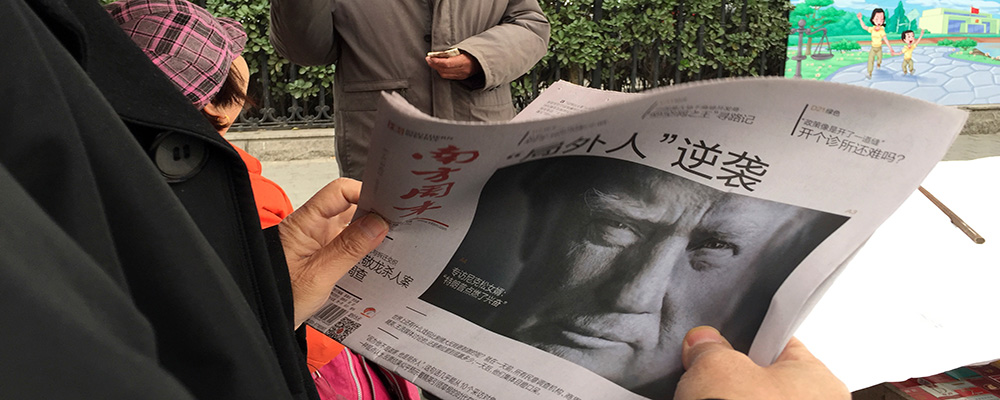Trump’s tune toward China has softened since his election, but the two still look set to collide. The latest muscle-flexing of the dollar has helped to inflame the problems that Trump promised to fix… like offshoring. If Trump wants to keep his promises, he will need to take action on the trade front.
Along with the dollar’s ascent, China’s domestic woes have raised the odds of a Sino-American head-on collision in 2017.
Domestic Difficulties
China has enjoyed remarkable GDP growth since opening up in 1979. But the nation now faces strong headwinds to future expansion.
China managed to dodge a recession after the financial crisis due to massive injections of capital by the state. Much of that money wound up funding unproductive projects (like the building of "ghost cities"). But now, that bill has come due, and it’s going to cause a lot of problems.
The Chinese know this and have been pulling their money out of China at an alarming rate. To stem the exodus, the state has imposed increasingly restrictive capital controls.
These issues have caused the yuan to fall rapidly against the dollar. To halt its decline, China has sold huge amounts of its foreign reserves. Since August 2015, when China unpegged the yuan from the dollar, it has burned through over $500 billion in reserves.
Analysts estimate that China needs around $2.7 trillion in reserves to meet the IMF’s foreign exchange reserve adequacy measures. With reserves down to $3 trillion, how long will China stay in this fight before it lets the yuan float?
These problems are coming to a head just as Chinese President Xi Jinping seeks his second five-year term at this year’s party congress. Xi cannot show any signs of weakness—like caving in to American demands—if he wants to retain his position and power. This has led the Eurasia Group to list potential overreactions by Xi to foreign policy threats as a top geopolitical risk for 2017.
If Xi opts to let the yuan float, it would likely weaken even further against the dollar. That would hit US exporters hard. Given Trump’s rhetoric toward China, it would force him to impose trade sanctions. If such actions were taken, how would it affect the US?
Implications for the US
All of America’s $660 billion in trade with China would be affected if barriers are enacted. Tariffs would push up the price of imported goods and hit US consumers hard. In 2013 alone, Walmart imported over $49 billion worth of goods from China.
As a result, major importers like Walmart and Target would likely see their revenues take a big hit. The fact that 69% of Americans have less than $1,000 in savings shows that consumers can ill-afford price hikes on everyday goods.
Exporters like Apple and Boeing that have large exposure to China could also be in trouble. Since China would be likely to respond in-kind to any US sanctions, such action would increase the cost of US goods for Chinese consumers. Also, US firms that manufacture in China would be in the firing line.
These actions would be negative for the US economy. Industries like retail and machinery are particularly vulnerable. Since these industries create a lot of jobs in the US, the fallout could have a big ripple effect.
While China has already enforced capital controls on outflows, the US could slap controls on inflows.
Given that the Chinese poured $110 billion into US real estate from 2010–2015, any controls on foreign inflows into the sector would be bad for future growth. In addition, Chinese direct investment into the US totaled $53.9 billion in 2016. If this demand disappeared, it could cause assets that rely on these inflows to crash.
Bonds are another likely battleground. China currently holds $1.1 trillion worth of Treasuries—17.6% of all foreign-held Treasuries. China’s Treasury holdings have fallen $200 billion since last summer and now sit at an eight-year low. If China continues to shed US debt, it could force yields to rise faster than Uncle Sam wants.
As you can see, the fallout from potential trade sanctions is wide-ranging and would impact US businesses and consumers greatly. Given that 2017 is ripe for such a scenario, how can we profit from it?
Patriotic Portfolio
If trade barriers are erected, investors should avoid firms that have large exposure to China (like Apple and Walmart). If such an event occurs, some sectors will be hit harder than others. This Deutsche Bank study that looked at sectors most at risk from sanctions and a Goldman Sachs report on S&P sectors with exposure to China are good starting guides.
On the flip side, the telecom and utilities sectors could be a good bet. Consider US-centric firms that have the majority of their production and demand in the US. These companies are least exposed and could benefit from trade restrictions.
The US-centric theme for the food, beverage, and tobacco sectors is also interesting. Keep in mind that these criteria are just a screening tool. To invest in a company, it must also have healthy fundamentals.
While an all-out trade war is unlikely, if Trump wants to keep his promises, he must reduce the huge Sino-US imbalances. This will entail significant disruptions in the economy, but for astute investors, it presents many opportunities.
On that note, I'll remove my writing cap for now. I hope you all have an excellent and productive week.
Stephen McBride
Chief Analyst, RiskHedge




